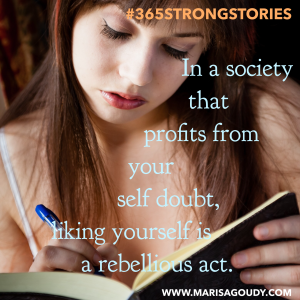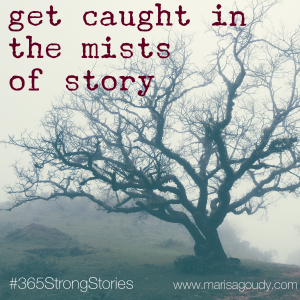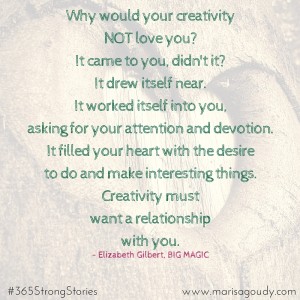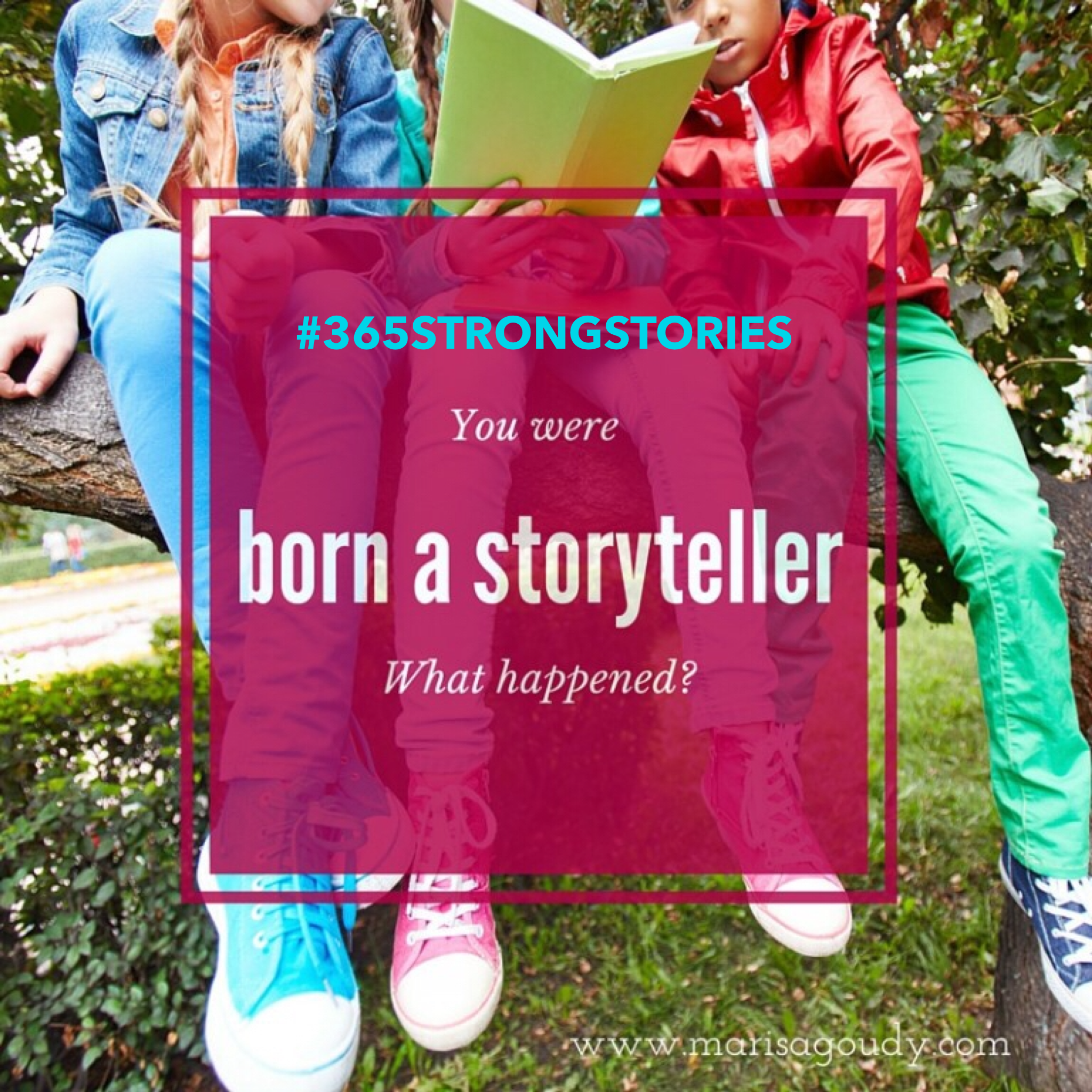
BLOG
An Invitation to Create Rather Than Sacrifice for the Next 40 Days, #365StrongStories 41
 “Oh, Marisa!” exclaimed a new client. “We worked together so long ago, but I have had your name filed away in my mind. When I saw one of your Strong Stories I knew that I had to call you.”
“Oh, Marisa!” exclaimed a new client. “We worked together so long ago, but I have had your name filed away in my mind. When I saw one of your Strong Stories I knew that I had to call you.”
Right there - that is the proof that forty days (and, often, nights) of collecting experiences from daily life, current events, and my own memory and sculpting them into stories has been worthwhile. Writing all these stories is in fact good for business. Gee whiz, content marketing does work!
Thing is, I’m not just powering through #365StrongStories to impress potential clients. My dedication to marketing just isn’t that robust! No, in order to devote up to an hour of each day conceiving, writing, image wrangling, and posting these stories, it’s got to more than a visibility gimmick.
I have dedicated myself to writing and sharing a story every day in 2016 because I want to show you that it’s possible.
You can look at the world with fresh eyes each day and tell a meaningful, authentic story that changes the reader in some small, vital way.
A Creative, Rebellious Act
But there’s another reason I launched this project. Let me share an an anonymous quote that has been following me around the internet:
“In a society that profits from your self doubt, liking yourself is a rebellious act.”
Here’s my truth: I’m writing and posting a story a day because I like what I write. I also happen to like the act of writing and the satisfaction of having written something.
And damn, to like myself and my writing enough to do it each day without fail is a personal rebellion for me right now.
It’s rebellious to send my two year-old to go find Daddy in the kitchen because I’m trying to get all the ideas on paper before dinner. It’s a rebellion against what mothers are “supposed” to do when I train my first grader to “respect the hand” and walk quietly away so mama doesn’t lose her train of thought.
This creative rebellion may just be about survival in a distraction-plagued world.
Thanks to 40 Days of Experience, Here's Some Insight into the Next 40 Days
It’s a delightful coincidence that I can speak from 40 days of creative practice at the moment we begin another 40-day cycle. Today is the first day of Lent, a time that is generally about sacrifice rather than creation.
To be honest, there has been an element of sacrifice inherent in this project. Giving up wine with dinner, Netflix and a snuggle with my husband, and desperately needed sleep - sometimes I do that grudgingly. Not infrequently, I’ve had to chose my commitment to my own project over my kids. And sometimes we’ve eaten frozen pizza so I could hit publish before I hit the pillow.
Guess what? Everyone still knows I love them and still manages to eat a balanced diet. And I’ve never had to give up anything that was too precious to lose. There’s a really good chance I would have spent that “quality time” sneaking peeks at my phone anyway!
Overall, #365StrongStories has been a creative celebration - even on the days I curse myself and this terrible, demanding project.
When you honor a daily promise to show up to the page and actively partner with the muse, you’re actively erasing self-doubt.
This is your invitation to create rather than sacrifice
It doesn’t have to be a yearlong project. It doesn’t even have to last 40 days. It doesn’t have to be about stories or even about writing.
But do consider how this period of the year that is significant to so many people can help you start a personal creative rebellion and kick meaningless sacrifice and self-doubt to the curb (regardless of religious affiliation).
I'm just inviting you to doing something every day that makes you like yourself a little better.
Have you seen the stories in my series? Subscribe to the weekly #365StrongStories Digest so you can catch up on these quick reads each Saturday morning.
Where does telling a nice story really take you? #365StrongStories 36
 Stories don’t generally emerge from self-discovery style writing prompts. At least not directly.
But sometimes, a probing personal question exposes a persistent inner villain - a calculating, weakling narrative that somehow threatens to sink all your strong, heroic stories.
Stories don’t generally emerge from self-discovery style writing prompts. At least not directly.
But sometimes, a probing personal question exposes a persistent inner villain - a calculating, weakling narrative that somehow threatens to sink all your strong, heroic stories.
Today, I stumbled across of a collection of expert advice on the heroine’s journey curated by a beloved colleague, Saundra Goldman.
It includes this prompt rom Natalie Goldberg, author of Writing Down the Bones:
Women are allowed to be powerful. You’re not going to find your voice being nice. You’re not going to find who you are. This is your lifetime. You want to say to yourself, “I want to live out of a more genuine, real, connected place,” and keep looking. And it takes time. Ask yourself, “Is this really something you want to do or is it another thing that makes you crazy?”
Questions for writing and reflection: How has being nice held you back? What are you doing right now that doesn’t feel genuine or coming from a deep place?
Last night, glancing over the daily stories I’ve written and shared in 2016, I started to panic. Goddesses, birth, fairytales, motherhood, and occasional mentions of football and entrepreneurship… what sort of lunatic businesswoman thinks that random, personal collection is going to bring in paying clients?
Apparently, this one does.
Playing it cool and trying to write what’s popular hasn’t ever worked for me. My power isn’t ever going to be found by writing nice posts that speak to my conception of the mainstream because I’ll end up feeling like a fraud who gets left high and dry.
All I can do is explore my power and exert the strength of my inner storyteller each day. I can dive deep and listen to the voice that says “you have something the world needs to hear.”
After all, how can I ever believe in your stories and help you make them sparkle and shine if I don’t believe in my own?
Caught in the Mists of Story, #365StrongStories 35
 “Mists of Avalon? Haven’t read it. My sister’s college roommate went insane when she read that book. Drew all the characters names and connections on the walls around her bed and never finished the semester.”
I don’t remember who said this to me, but I have shelved the conversation with all the other memories of the book I credit with changing my life.
“Mists of Avalon? Haven’t read it. My sister’s college roommate went insane when she read that book. Drew all the characters names and connections on the walls around her bed and never finished the semester.”
I don’t remember who said this to me, but I have shelved the conversation with all the other memories of the book I credit with changing my life.
Marion Zimmer Bradley’s sweeping Arthurian epic with all its feminism and paganism and didactic wonder rewrote my relationship with religion. It the long process of questioning, abandoning, reconciling, and finally building my own mature relationship with the Catholicism of my childhood.
It was a big deal for me. But I didn’t flunk out of high school because I thought I was Morgaine.
And yet, I do get lost in stories. I know my addiction is stronger than most, but every person craves and creates stories. These days, it’s not just writers, but also psychological researchers, marketers, and neuroscientists who talk about how stories are at the core of our humanity.
Is it strange to rearrange one’s spiritual beliefs based on a book? It feels a little embarrassing to admit I’m so vulnerable to story.
Oh, wait, isn’t that exactly what all religions with a written tradition rely upon? Myths, legends, oral tradition captured on paper generations later that eventually become the backbone of an entire faith? I’m in good company (and some not so good company). It’s just part of being human.
Ask Your Beloved Creations to Love You Back, #365StrongStories 28
 A teacher of environmental biology asks her two questions at the start of each semester.
“Do you love nature?” Yes, of course. Every hand is raised.
A teacher of environmental biology asks her two questions at the start of each semester.
“Do you love nature?” Yes, of course. Every hand is raised.
“Do you believe that nature loves you in return?” Not a single earnest academic was going to be caught dead admitting to something so… pagan.
Elizabeth Gilbert tells this story in Big Magic to prove that we have a right to be in conversation with Mother Earth, with creativity, with whatever great superhuman force we happen to love.
I keep coming back to Liz’s idea when I secretly reread the stories I have written over the first month of this #365StrongStories project. The way these pieces flow through me and the streams of information and experience rush on, even the post from a few days ago can take me by surprise.
It’s fashionable to bemoan the narcissism of the age. All those selfies we take proves that we’re self-obsessed, right? When I admit that I go back and look at my own work and smile when there’s so much other worthy content to consume… does that prove I have some 21st century sickness?
I don’t think so. Instead, it feels like I am giving my creations a chance to love me back.
You know what it takes to write something that feels worthy of publishing. And you know how hard it is to connect to the reader, even when you’re pouring your best into a post. There’s no guarantee the right people will see what you write and that they’ll have their thumbs prepared to send a response that assures you all the hard work was worth it.
Based on my experiences telling my own Strong Stories, this is my invitation to you: do the work (at your own rate) - the thinking, the writing, the posting, the publicizing. Then, ask those words to love you back when you revisit them.
I never really believed that you need to write for yourself first. Not when I was so desperate to be seen and validated. But finally, I’ve arrived at a place where I give myself permission to stop and see myself and recognize what I’ve made… That’s the nature of real creative magic.
When did you stop telling stories that mattered to you? #365StrongStories 23
 I’d been born a storyteller. Fearless. Impassioned. Believing that it was just as easy to write a story as it was to read one.
But then…
I’d been born a storyteller. Fearless. Impassioned. Believing that it was just as easy to write a story as it was to read one.
But then…
I fell in love with a more ambitious, committed writer. Praising a story became more important than writing one.
I got caught up in the scholarly race of college. Analyzing literature became more important than creating it.
I landed a job in academic library administration. Managing the collection became more important than adding to it.
I built a series of website and copywriting businesses. Marketing strategy became more important than getting to the core of the stories I was always meant to tell.
For almost half my life, I nudged my stories at the back of the line.
I told the stories I felt I was supposed to tell. The stories that served and supported others. The stories that seemed useful. The stories that I prayed would be practical and profitable.
Funny. Very few of those stories were worth a damn.
Writing for the sake of writing. Writing for pleasure, passion, expression… That was a nice hobby, confined to the journal page. It seemed like the greatest decadence, a suspect and selfish act, to craft stories of my own. Growing up, it seemed, meant putting aside the stories that really mattered to me.
I know there are countless creative women - and men - who stand beside me and say “me too.” I know that I am amongst the fortunate who has found her voice and can say aloud “not any more.”
Bring on the selfishness, bring on the devotion, bring on the act of being in service to the page - even when someone hangs on my elbow and reminds me that I need to keep my mind on other stories too. If I’m really a storyteller, I can balance and juggle and spin all these tales together into work that makes life sing.
... And so can you. I believe that every strong story told for the greater good begins with devotion to what you really need to say - it's the first step to telling a story that connects.
